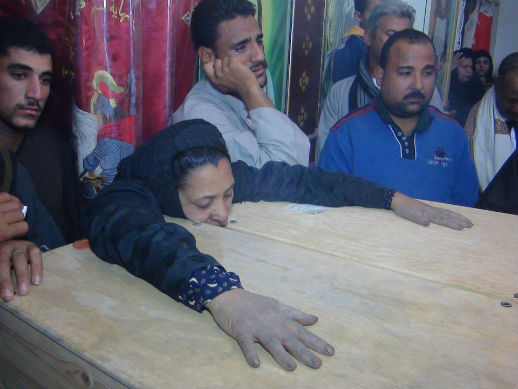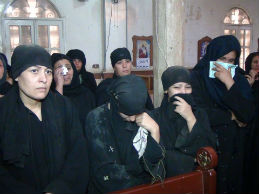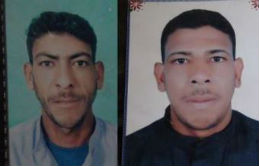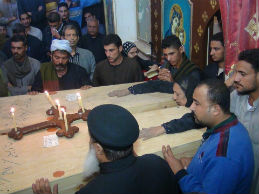
Today, 16 December, is the date set for the signing of a UN-facilitated agreement on forming a new national unity government in Libya. Since the fall of Muammar Gaddafi in 2011, the country has been engulfed by conflicts between various coalitions of armed groups. The country is split between an internationally recognised government and rival groups contending for power. However, experts see this political development as likely to make little difference to the chaotic situation. The rise of armed groups which have pledged allegiance to Islamic State has further exacerbated the risks. World Watch Monitor has heard in detail about the recent deaths of two Egyptian Coptic Christians caught up in the lawlessness:
For Wasfi and Fahmi Michael, there wasn’t much of a choice.
“My sons had to go to Libya to simply put food on the table,” said Bakhit Michael, father of the two Copts, slain in November.
“There was no way for them to earn a living here at home,” the 60-year-old bereaved father said, noting his sons’ wages in Libya were supporting their own wives, their mother and him in a village off Sohag, 292 miles south of Cairo.
Four brothers, including the murdered Wasfi and Fahmi, their two sisters, their mother and father, all shared one home, with each sibling and spouse in a different room.

So far, the story of this family does not differ from a common narrative of poverty and lack of opportunity lived by many households in Upper Egypt, in the country’s south.
“Back home, they could only hope to get 60 Egyptian pounds [about US$7] a day, hardly enough to buy a sack of flour,” the father told World Watch Monitor. Nor could they count on regular wages.
“They could be working a day, stay idle and unpaid for three more!”
This compares to at least 50 dinars, or about $35, a day in the hitherto oil-rich neighbouring Libya.
For the Christians, the ordeal wouldn’t have differed from that faced by their Muslim compatriots, had it only been a matter of economic and social deprivation. But following an all-too-familiar scenario faced by many Christians in an increasingly assertive Islamic Middle East, the Christian Egyptians were picked precisely for being that: Christians.
The two brothers had been in Libya for the greater part of a decade. They were at different times joined by the other two brothers, Sabri and Tharwat, as well as by two cousins on both sides of the family, Nasser and Ashraf. Their tools of trade were simple handyman tools, and their home in Misrata, in western Libya, was one room shared by all four. Rooms in the same building housed other Egyptians – Muslims and Christians – from Upper Egypt.
Early last month, Wasfi and Fahmi Michael were tricked by a Libyan into going out “to inspect a job”. The 36-year-old builder and his 29-year-old brother, both uneducated, were picked up by the man, while Mohamed Shaaban, a fellow helper, was asked by the Libyan to stay behind.
“There’s no need to bring Mohamed along. You and your brother are good enough to do the job for now,” Mohamed later told Sabri the Libyan man said to them.
Later, the bodies of both Wasfi and Fahmi were recovered with “white gloves on their hands,” a likely sign of their murder as the work of Ansar-ul Sharia, one of many militant Islamic groups now active in lawless Libya.
“The money on Wasfi, a total of 14 thousand Libyan dinars [more than US$10,000] was left untouched. Wasfi used to take all his earnings wherever he went to safeguard against theft, if left at their communal accommodation,” said Nasser Michael.
“Forensics put the likely date of their murder as 12 November, seven days after their kidnap,” he said.
Killed for being Christian
After 20 Egyptian Christians (and one Ghanaian) were killed – and their deaths filmed as a ‘spectacle’- on a Libyan beach by IS in February, the Christians were left in no doubt as to their precarious position after the Egyptian government told them to leave Egypt.

World Watch Monitor
“My three brothers and other Christians tried to go back to Egypt. But they were left stranded,” 25-year-old Tharwat Michael said.
An unknown number of Coptic Christians, including from the Michael brothers’ village and surrounding towns, are still left trapped in Misrata, said Father Soliman Botrous, a priest from the brothers’ church in the village of Awlad Ali.
“The roads are all unsafe. If they take the land route to Egypt, they must pass by Sirte. ISIS is there waiting. If they try to reach Tripoli for the airport, Fajr Libya [Libya Dawn militias] and again ISIS control the area,” Tharwat said.
“Bye Dad for now, a Libyan is at the door coming to pick us up for work”
“Right up to the time of their murder, they could find no safe way through!” the younger brother said.
Either way, being Christian meant a likely death sentence.
“For instance, at Sirte, on the road from Misrata to Egypt, Christians are made to disembark from cars and are taken to their death,” Fr. Botrous added.
“A month ago, Wael Farouq, a Christian from the nearby Egyptian village of Shawawnah, suffered bone fractures in his work in Misrata. He had to go back to Egypt for treatment. A doctor in Libya, an Egyptian, helped issue him identity papers as a Muslim, so he was able to cross the land route. At Sirte, the vehicle was stopped in search of Christians. When they found all to be Muslims, the car was allowed to pass,” he said.
‘They kept the faith’
On 6 November, Wasfi Michael was picked up from home as agreed by the presumed Libyan contractor at 4pm, said Sabri, the brother who shared a room with Wasfi and Fahmi.
“By 6pm, neither Wasfi’s, nor Fahmi’s, phones were answering,” he said.
It was not until 10 days later that the bodies were identified in a hospital in nearby Zleiten. Sabri, and the two cousins Nasser and Ashraf, learnt that the bodies of Wasfi and Fahmi were dumped on 14 November in the desert, 160 km from their Misrata home.

“Their Christian ‘tattoos’ of the Virgin, St. George and of crosses on their arms were cut repeatedly with a penknife,” Nasser said. Their captors had tried to forcibly remove the typical Christian symbols, more common among rural Copts, he said.
The bodies were moved to a hospital in Misrata on 17 Nov. “At the second hospital, they at first resisted stating the cause of death as murder. They wanted to state it as ‘death by natural causes’,” Nasser said.
After a very late intervention by the Egyptian Ambassador, the only help the family recalled being offered by Egyptian authorities, the deaths were stated as due to “gunshots to both heads above the eyebrow line.”
Procedural woes only added to the family’s suffering.
“They would not renounce their faith, but kept it till last. This makes us walk with heads up high!”
“It took us eight days in Misrata hospital to finish the papers to release the bodies to the aeroplane,” Nasser said.
Once landed at Alexandria on 25 Nov., however, airport authorities kept the family waiting from 5pm until 1am to release the bodies, and the family then had to pay for an ambulance to take them, Tharwat Michael added.
Bakhit Michael recollected the last time he heard from his eldest son: “Often we’d ask them to come back. They said they could only wait till the roads were safe to do so. On 6 November, Wasfi and Fahmi talked to me and to their mother on the phone. They asked me if I needed anything. I said we were missing them. Wasfi said ‘Bye Dad for now, a Libyan is at the door coming to pick us up for work.’ That was the last we heard from them.”
Back in the Awlad Ali village church, the funeral was full of mourners.
“For all the pain we feel, we know they are in heaven. They would not renounce their faith, but kept it till the last. This makes us walk with heads up high!” the father said, indicating that his sons must have been pressurised to recant their faith.
And for a Church long acquainted with a sustained history of persecution, Fr. Botrous had this to say: “Wasfi and Fahmi are martyrs for Christ. They kept the faith to their last breath, and are now crowned in heaven.”
For those left behind, a simple plea for comfort and peace is all that is now needed, he added.